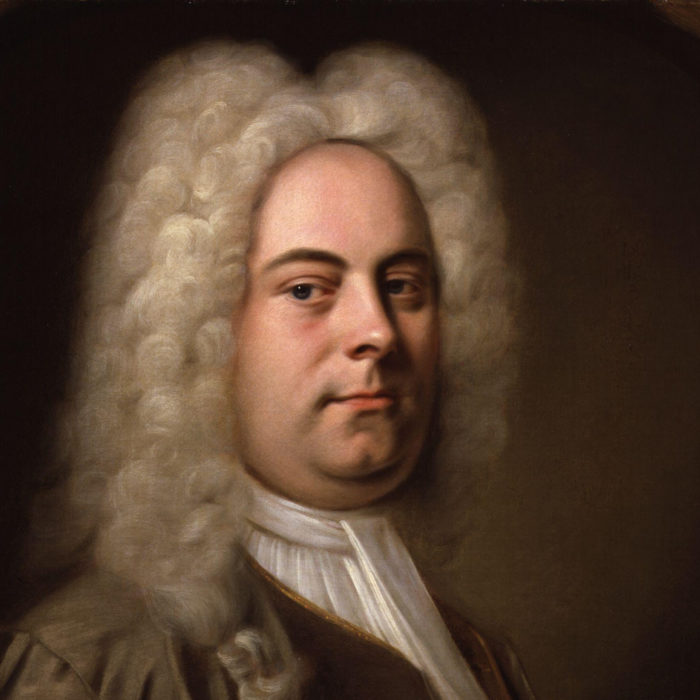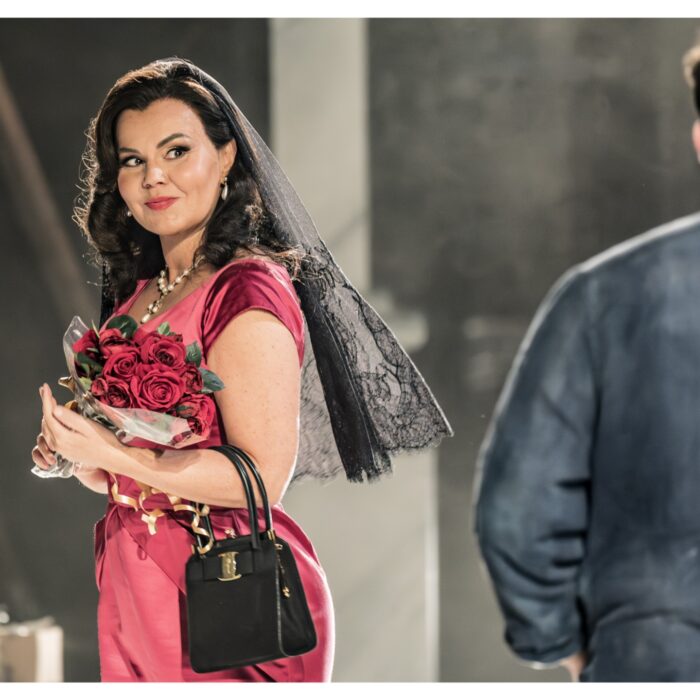
George Enescu International Festival, Bucharest 2025 Review: Lady Macbeth Of Mtsensk
AI Left Behind In A Dramatically Strong Performance Directed By Giancarlo Guerrero
By Alan Neilson(Photo: Alex Damian)
This year’s George Enescu International Festival in Bucharest marked the 70th anniversary of the composer’s death, which it commemorated with more than 40 performances of his works. Such is the scope of the festival, which brought together more than 4,000 artists over a four-week period during August and September, that it had the time and space to celebrated a number of other composers, including Pierre Boulez and Ravel, to mark the 100th and 150th anniversaries of their births. It also commemorated the death of Shostakovich with a concert performance of his opera “Lady Macbeth of Mtsensk” for what was its first Romanian performance.
AI Fails Miserably in its Attempt to Provide a Meaningful Context
It is often the case that concert performances rarely conform to the basic format but take on various characteristics of a staged performance. For this presentation of “Lady Macbeth of Mtsensk,” the decision was taken to use AI generated images of the drama, designed by Carmen Lidia Vidu, using the singers’ real faces, projected onto the back wall, behind the orchestra. It proved to be a bad decision, both as an idea and in its execution.
To be clear, this was not a video but static images that can best be described as comic book cartoons using photographs of real people as found in children’s comics in the 1970s, which proved to be unpopular and did not catch on. The images were not at all lifelike, to the point that it was difficult to recognize the face of each singer with certainty, and the poses and facial expressions were often absurdly exaggerated. This was further complicated by the fact some singers were double-parted and that Sergie Polyakov, playing the role of Sergie, was a last-minute replacement, so that he looked nothing at all like his AI image. It all looked very cheap, unimaginative and undermined rather than promoted the musical side of the performance. It would have been far more successful if no imagery at all had been employed.
Stage designers can take a sigh of relief; AI is not going to threaten their livelihoods anytime soon if this is the standard on offer.
This, however, was the only negative criticism of the performance, which in all other respects was excellent.
The star of the evening was undoubtedly the conductor Giancarlo Guerrero, who oversaw a dramatically strong and emotionally compelling performance from the Romanian Radio National Symphony Orchestra, in which he successfully brought out the score’s textural depths and rhythmic vitality. It was also a reading that captured the score’s detail, subtle and not so subtle contrasts. In many scenes, he drew an energetic, urgent, even wild intensity from the orchestra that propelled the drama forward and brilliantly captured its underlying tensions; in other scenes, the sound was soft and reflective and allowed the tensions to temporarily dissipate and the emotions to calm. Guerrero conducted with flair and a confident air throughout, which was reflected in the orchestra’s vibrant performance and the animated interpretations of the singers. The only negative criticism being, that on occasions, the sheer force and urgency of the orchestra was ear splittng; it was far too loud.
The role of Ekaterina Lvovna is technically, emotionally and dramatically demanding, requiring a singing actress of quality with plenty of stamina. Of the nine scenes, she appears in eight and is usually at the centre of the action. She has many demanding monologues, arias and duets and engages in numerous intense interactions with Sergei, Boris and Zinoviy. Moreover, it is a role that needs a singer who is able to bring depth, nuance and passion to her characterization, for Ekaterina is a very complex role; she commits heinous crimes and yet must retain the sympathy of the audience. She is a victim and a perpetrator, abused and an abuser. The singer must capture her intense loneliness, her suffering and torment, as well as her love, guilt and courageous independent spirit.
Opolais Leads In A Compelling Performance As Ekaterina
Soprano Kristine Opolais, cast in the role, produced an exceptional reading. From her opening monologue, “Oh, I don’t feel like sleep any more,” she dominated the role, clearly spelling out her loneliness and depressed state in an expressively compelling rendition using her vocal versatility and ability to coat her lines with emotional depth. Her aria “The foal runs after the filly,” in which she gives voice to her independent spirit, was an absolute delight. Ekaterina’s sense of determination was allowed to grow slowly from her softly spun opening lines into a forceful statement before subsiding as she retires to bed. The contrast and sensitivity she was able to bring to the aria were incredibly beautiful and very moving.
Of course, there were many aggressive confrontations with Boris, Zinovy, Sergie and Sonyetka, with which Opolais fully engaged, voicing her frustrations, fears, anger and hatred with an expressive intensity, in which she moved her voice rapidly between registers, accenting and coloring the lines and pushing the voice to its limits, but never losing control. There were also loving moments between Ekaterina and Sergie, for which they adapted their voices to create a convincing loving connection.
Although presented as a concert, Opolais produced a physically animated performance so that her movements were always in step with her emotional state and the dramatic circumstances.
Boris, Ekaterina’s father-in-law, is a man without redeeming features. He is a domineering bully who uses his power to take advantage of all those around him, including his own son, whom he humiliates and his daughter-in-law for whom he has sexual desires. Bass, Andreas Bauer Kanabas expertly caught Boris’ personality in a brutal characterization that left nothing to the imagination; he was violent, vicious and appeared to enjoy indulging his negative feelings. He was thoroughly unlikeable. When Ekaterina poisons him, the sympathy lies entirely with her. He possesses a dark, resonant voice with a cruelty that he allowed to permeate his singing. He never held back but happily expressed the force and depth of his malevolence. As the orchestral sound increased in strength with rising tensions, his voice sailed above with a threatening ease. Even after eating the poisoned mushrooms, in which he spluttered and gasped for air as he lay dying, his desire for vengeance lived on as he attempted and failed to tell his son that he had been poisoned. He then returned as a ghost to threaten vengeance on Ekaterina; his voice once again twisted with malice booming out above the orchestra.
His son, Zinoviy, was given a nicely measured portrayal by tenor Vincent Wolfsteiner, who presented him as weak and pathetic, unable to stand up for his wife when she was publicly shamed by Boris. His pleasing soft tenor ensured that he came across as meek, while his unstable reaction to his father’s murder was what one would expect from a man of such quality; his anger, aggression and threatening attitude toward Ekaterina were wildly expressed, but the voice did not carry the intent of a strong-willed man. The scene crackled with tension, as Opolais and Wolfsteiner’s nicely matched voices clashed, but it was Ekaterina’s character which came across as dominant.
Sergie is a man who looks out for himself. He is a womanizer always on the look out for the next opportunity. His attitude towards Ekaterina is ambiguous; whether he seduces or rapes her in Act one depends on the interpretation of the director; however, she certainly falls in love with him during the encounter, and there is a period in which he might have been truly in love with her. Certainly, that is the way tenor Sergie Polyakov, playing the role of Sergie, characterized his relationship with her, particularly in scene five, in which his passionate and earnest singing conveyed such a message. In fact, there was a lot one could admire about Polyakov’s presentation of Sergie; he was confident and sang with a swagger; he was courageous and adventurous, which made his betrayal of Ekaterina on the road to a Siberian prison camp all the more vicious and dramatically shocking.
There are many secondary characters, all of which were given convincing portrayals. However, there were a number of performances that stood out.
Contralto Maria Barakova produced a lively, confident and well-defined characterization of Sonyetka, a fellow convict, whom Sergie turned his attentions towards with disastrous consequences for both Sonyetka and Ekaterina.
Tenor Andrei Popov was double-parted as the Drunken Guest and the Tattered Peasant, for which he presented two clearly defined, animated portraits that involved a lot of screeching and mimicking and allowed him to show off his vocal skills with an impressive rendition of the monologue “Once a lady friend of mine.”
Bass Beniamin Pop showed off his distinctive timbre and carefully crafted phrasing with neatly crafted, expressive characterization of the Priest.
The Romanian Radio Academic Choir, coached by Ciprian Tutu, was in fine voice with a spirited, vibrant and confident performance in the roles of Laborers, Convicts, Wedding Guests and Policemen.
Overall, this was a splendid musical performance that captured the dramatic structure of the narrative, despite the interference of the AI generated images, while the layered characterizations presented by the singers brought the personalities of their roles thrillingly to life. It was, in effect, a performance that communicated with more force, immediacy and depth than many fully staged opera performances, such was its quality.



